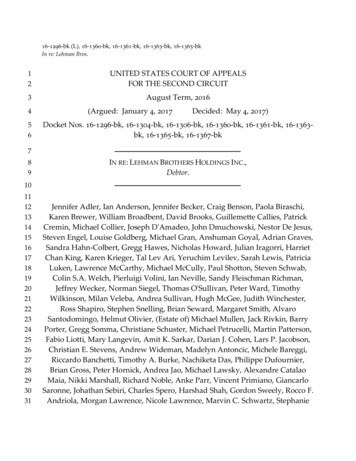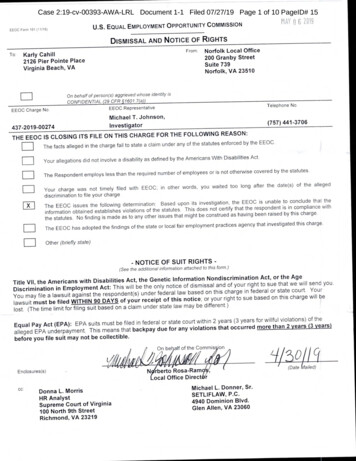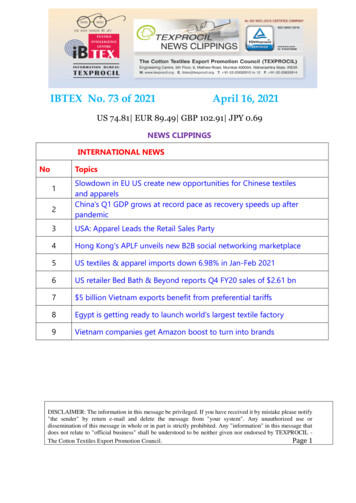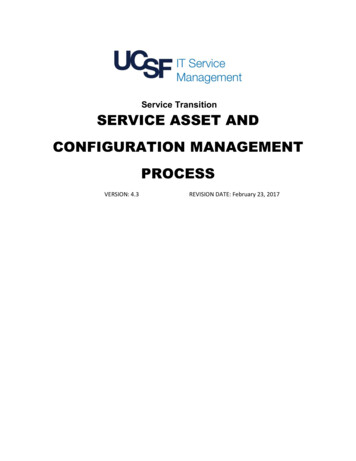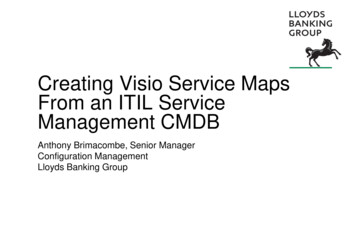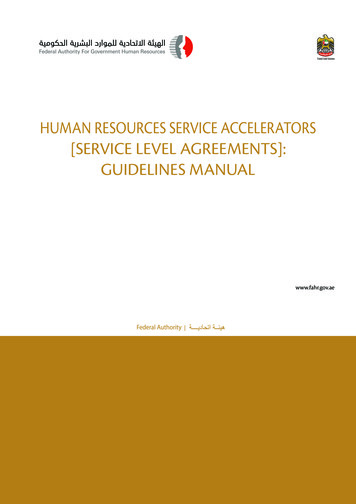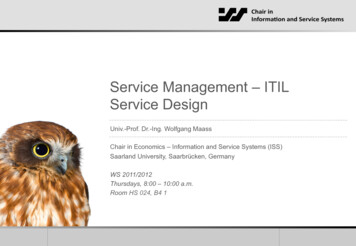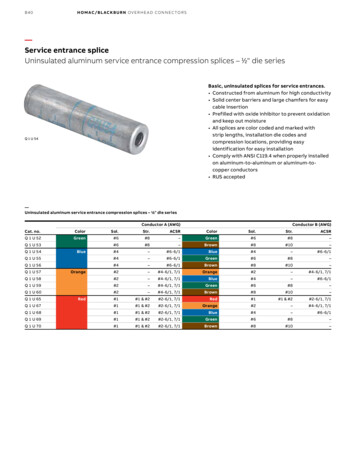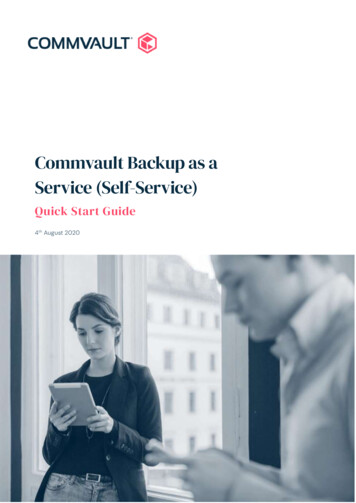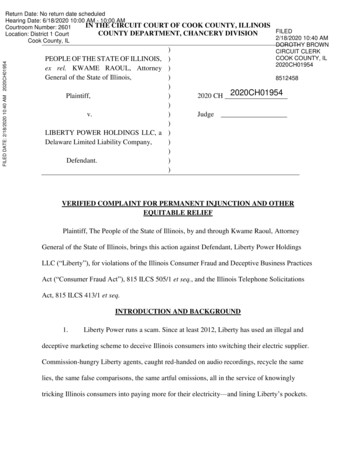
Transcription
FILED DATE: 2/18/2020 10:40 AM 2020CH01954Return Date: No return date scheduledHearing Date: 6/18/2020 10:00 AM - 10:00 AMIN THE CIRCUIT COURT OF COOK COUNTY, ILLINOISCourtroom Number: 2601FILEDCOUNTY DEPARTMENT, CHANCERY DIVISIONLocation: District 1 Court2/18/2020 10:40 AMCook County, ILDOROTHY BROWN)CIRCUIT CLERKCOOK COUNTY, ILPEOPLE OF THE STATE OF ILLINOIS, )2020CH01954ex rel. KWAME RAOUL, Attorney )General of the State of Illinois,))Plaintiff,))v.))LIBERTY POWER HOLDINGS LLC, a )Delaware Limited Liability Company,))Defendant.))85124582020CH019542020 CHJudgeVERIFIED COMPLAINT FOR PERMANENT INJUNCTION AND OTHEREQUITABLE RELIEFPlaintiff, The People of the State of Illinois, by and through Kwame Raoul, AttorneyGeneral of the State of Illinois, brings this action against Defendant, Liberty Power HoldingsLLC (“Liberty”), for violations of the Illinois Consumer Fraud and Deceptive Business PracticesAct (“Consumer Fraud Act”), 815 ILCS 505/1 et seq., and the Illinois Telephone SolicitationsAct, 815 ILCS 413/1 et seq.INTRODUCTION AND BACKGROUND1.Liberty Power runs a scam. Since at least 2012, Liberty has used an illegal anddeceptive marketing scheme to deceive Illinois consumers into switching their electric supplier.Commission-hungry Liberty agents, caught red-handed on audio recordings, recycle the samelies, the same false comparisons, the same artful omissions, all in the service of knowinglytricking Illinois consumers into paying more for their electricity—and lining Liberty’s pockets.
FILED DATE: 2/18/2020 10:40 AM 2020CH019542.The fraud is intentional. The explosive audio recordings alone reveal, amongother reprehensible business practices, that Liberty targets the elderly and people withdisabilities. According to Liberty’s own words, its over-priced products are “specificallydesigned for people on a fixed income,” such as “people with disabilities” and those on“disability income.”3.Liberty’s fraudulent scheme also includes outright theft. Its agents stealconsumers’ personal information, forge their signatures, and switch their service without theirconsent, a reviled practice known in the industry as “slamming.”4.The size of the fraud is even more staggering than the methods are despicable.Liberty has scammed tens of thousands of Illinois consumers out of over 77 million. Since2016, Liberty has overcharged Illinois consumers by an average of over 1 million per month.During that same period, Liberty’s rates—rates that Liberty promises are “low,” will provide“price protection,” and will result in “savings”—have been higher than the comparable utility’srate over 99% of the time. The fraud is ongoing.5.The State brings this action to stop Liberty’s illegal conduct, recover tens ofmillions of dollars Illinois consumers have lost to Liberty’s fraud, require Liberty to pay civilpenalties authorized under the Consumer Fraud Act, and revoke Liberty’s authority to operate inthe State.PARTIES6.Plaintiff, the People of the State of Illinois, by Kwame Raoul, the AttorneyGeneral of the State of Illinois, is authorized to enforce the Consumer Fraud Act and theTelephone Solicitations Act.2
FILED DATE: 2/18/2020 10:40 AM 2020CH019547.Defendant, Liberty, a Delaware limited liability company with its principal placeof business at 2100 W. Cypress Creek Road, Suite 130, Fort Lauderdale, Florida, 33309, is analternative retail electric supplier (“ARES”) certified by the Illinois Commerce Commission(“ICC”) to engage in the sale of electricity to residential retail customers in the service area ofthe Illinois public electric utilities, ComEd and Ameren. At all relevant times, Liberty wasengaged in trade and commerce in Illinois by marketing, selling, and promoting electricitysupply to Illinois residents.8.For purposes of this Complaint, any references to the acts and practices of Libertyshall mean such acts and practices are by and through the acts of Liberty’s officers, owners,members, directors, employees, representatives and/or other agents, including especially thirdparty vendors who market electricity supply on Liberty’s behalf.PUBLIC INTEREST9.The Illinois Attorney General believes this action to be in the public interest of thecitizens of the State of Illinois and brings this lawsuit pursuant to the Illinois Consumer FraudAct and the Illinois Telephone Solicitations Act.JURISDICTION AND VENUE10.This Court has jurisdiction over this action pursuant to the Court’s generaljurisdiction and pursuant to 815 ILCS §505/1 et seq. and 815 ILCS 525/1 et seq., as the cause ofaction arises from actions taken by Liberty in Illinois.11.This Court has personal jurisdiction over Liberty because it transacts business inIllinois, including in Cook County, Illinois.12.Venue for this action is proper in Cook County, Illinois, pursuant to Section 2-101and Section 2-101(a) of the Illinois Code of Civil Procedure, 735 ILCS 5/2-101, 101(a), because3
FILED DATE: 2/18/2020 10:40 AM 2020CH01954Liberty is doing business in Cook County, Illinois, and some of the transactions out of which thisaction arose occurred in Cook County, Illinois.TRADE AND COMMERCE13.Subsection 1(f) of the Consumer Fraud Act, 815 ILCS 505/1(f), defines “trade”and “commerce” as:The terms ‘trade’ and ‘commerce’ mean the advertising, offering forsale, sale, or distribution of any services and any property, tangibleor intangible, real, personal, or mixed, and any other article,commodity, or thing of value wherever situated, and shall includeany trade or commerce directly or indirectly affecting the people ofthis State.14.At all times relevant to this Complaint, Liberty was engaged in trade andcommerce in the State of Illinois by marketing, selling, and promoting electricity supply toIllinois residents.RETAIL ELECTRICITY SUPPLY INDUSTRY15.Each public electric utility in Illinois has a defined service territory and serves allretail (i.e., residential and small business) customers in that territory. Traditionally, electricutilities have provided both electricity supply and the distribution service that delivers theelectricity to consumers.16.The ICC reviews the prices public electric utilities are permitted to charge eligibleresidential customers for electricity supply. This default price reflects the utility’s cost forpurchasing the electricity, without any mark-up for profit.17.Public electric utilities, like ComEd and Ameren, are the default suppliers ofelectricity to consumers. However, under the Illinois Electric Service Customer Choice and RateRelief Law of 1997, 220 ILCS 5/16-101 et seq., consumers may choose to purchase theirelectricity supply from an ARES rather than their public utility. If a consumer decides to switch4
FILED DATE: 2/18/2020 10:40 AM 2020CH01954to an ARES, the consumer continues to pay the utility for delivery service but pays the ARES toacquire the electricity that the utility delivers to the consumer. Regardless of which entity theconsumer selects as their supplier, the utility continues to deliver electricity to the consumer’shome.18.Even if a consumer chooses an ARES for electricity supply, the utility continuesto bill and collect from the customer the total of the supply charge (as set by the ARES) plus thedelivery charge (the rate approved by the ICC) and other incidental fees and taxes. The ARESdoes not send a separate bill to the consumer.19.ARES must be licensed by the ICC in order to sell electricity supply in Illinois.But unlike public utilities, ARES’ rates are not regulated or reviewed by the ICC, and ARES arepermitted to profit from the sale of electricity supply.20.According to the ICC, ARES customers would have saved more than 870million over just the last five years if they had instead elected to purchase their electricitydirectly from the public utility.LIBERTY’S BUSINESS PRACTICES21.In April 2007, Liberty received a Certificate of Service Authority from the ICC tooperate as an ARES in Illinois. Under the certificate, Liberty may sell electricity to eligibleresidential and nonresidential retail customers in the ComEd and Ameren service areas, and has acontinuing statutory obligation to comply with all enumerated requirements for certification and“all other applicable laws and regulations,” pursuant to 220 ILCS 5/16-115(d)(8) and 220 ILCS5/16-115A(a)(ii).22.Since 2012, Liberty has engaged in the marketing and sale of electricity to Illinoisresidential customers in the ComEd and Ameren service territories.5
FILED DATE: 2/18/2020 10:40 AM 2020CH0195423.Liberty charges its customers based on how much electricity (measured inkilowatt hours) the customer uses each month. Liberty offers different rates (price per kilowatthour), rate types (fixed rates and variable rates), and lengths of contract.24.Liberty typically enrolls consumers in a fixed rate product, usually for a term of12 or 24 months. During the term, Liberty charges consumers the same rate each month for theirelectricity supply. This rate is almost always higher than the default utility rate.25.Near the end of the initial contract term, Liberty contacts the customer offering toenter the customer into a new fixed rate. If the customer does not respond to the notice, orchooses not to enter into a new fixed rate with Liberty by the time the initial fixed rate contractexpires, Liberty automatically renews the customer’s account without any affirmative act by thecustomer, on a month-to-month basis at a variable rate. The customer remains on this variablerate indefinitely.26.Liberty’s variable rates can dramatically increase at any time without prior noticeto the customer and are almost always higher than the default utility price. The only time this rateis regularly disclosed to customers is at the end of the month when they receive their monthlybill, after they have already used and been billed for their electricity supply at that rate.27.Regardless of the rate plan, the rates charged to customers for Liberty’s productswere usually higher than the default rate customers would have paid to their utility. In fact, since2016, Liberty’s rates have been higher than the default utility’s rate over 99% of the time.28.Liberty conducts marketing activities in Illinois in the form of door-to-doorsolicitations, in-person solicitations at retail establishments (e.g., shopping mall kiosks), andtelephone solicitations (“telemarketing”). Liberty advertises its product on its website and alsohas engaged in some digital marketing.6
FILED DATE: 2/18/2020 10:40 AM 2020CH0195429.Since 2012, Liberty has employed third-party vendors to market the sale ofelectricity supply (collectively “sales representatives”) to Illinois consumers via door-to-doorsolicitations, in-person solicitations at retail establishments, and telemarketing.30.Liberty provides scripts to its sales representatives. The scripts instruct the salesrepresentatives on how to interact with customers by telephone and in person and how to marketLiberty’s products and services. Liberty prohibits sales representatives from using any scriptsthat it does not approve.31.When enrolling a new customer either by telephone or in person, Liberty uses atwo-step process. First, a sales representative attempts to convince the consumer to enroll withLiberty. Second, if a consumer agrees to enroll, Liberty confirms the enrollment using astatutorily-required third-party verification (“TPV”) system or letter of agency.32.Illinois law prohibits sales representatives from performing the enrollmentverification, and the verifier must be independent from both the electric supplier and itsmarketing agent.33.Liberty is responsible for selecting and contracting with third parties to performverifications.34.The purpose of a third-party verification is to ensure that the consumer fullyunderstands the terms and conditions of the service being offered, has the legal authority to effecta change on the account, and authorizes the change in electric suppliers. However, Liberty’sthird-party verifiers quickly roll through the verification process, frequently without allowing theconsumer to fully answer or confirm an understanding of the questions presented—all in aneffort to subscribe the consumer to Liberty, and all in violation of Liberty’s statutory obligationsunder Illinois law.7
FILED DATE: 2/18/2020 10:40 AM 2020CH0195435.In order to keep the sales solicitation separate from the enrollment verification,Illinois law requires that during the third-party verification of the customer’s enrollment, salesrepresentatives must drop off the call once the consumer is connected with the verificationsystem. However, in violation of Illinois law, Liberty’s sales representatives remain on thetelephone line during the third-party verification process and direct the consumer on how toanswer certain questions.36.Once a sale is completed and the enrollment is verified, the vendor sends theconsumer’s information to Liberty to complete the enrollment.37.Liberty pays third-party marketing vendors based, in part, on the number of newcustomers they enroll with Liberty. This commission-based compensation model createspowerful incentives for Liberty’s agents to defraud consumers.Liberty’s Misrepresentations, Omissions, and Other Violations38.Liberty’s sales representatives make misrepresentations and omissions with theintent that consumers rely on those misrepresentations and omissions.Savings Misrepresentations39.Liberty’s sales representatives tell consumers that they will save money on theirelectricity bill if they enroll with Liberty. For nearly every consumer, this representation is false.40.Liberty makes savings claims and omits information about the cost of its servicein order to convince consumers to switch suppliers. Liberty makes these savings claims with theintent that consumers rely on them when they choose Liberty as their electric supplier.41.In recorded solicitations, Liberty’s sales representatives portray Liberty’s rates asa discount on the service consumers are curren
General of the State of Illinois, brings this action against Defendant, Liberty Power Holdings LLC (“Liberty”), for violations of the Illinois Consumer Fraud and Deceptive Business Practices Act (“Consumer Fraud Act”), 815 ILCS 505/1 et seq., and the Illinois Telephone Solicitations Act, 815 ILCS 413/1 et seq. INTRODUCTION AND BACKGROUND 1. Liberty Power runs a scam. Since at least 2012, Liberty
